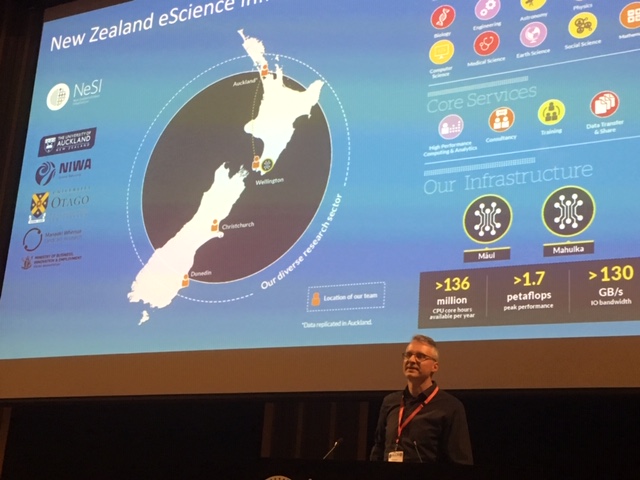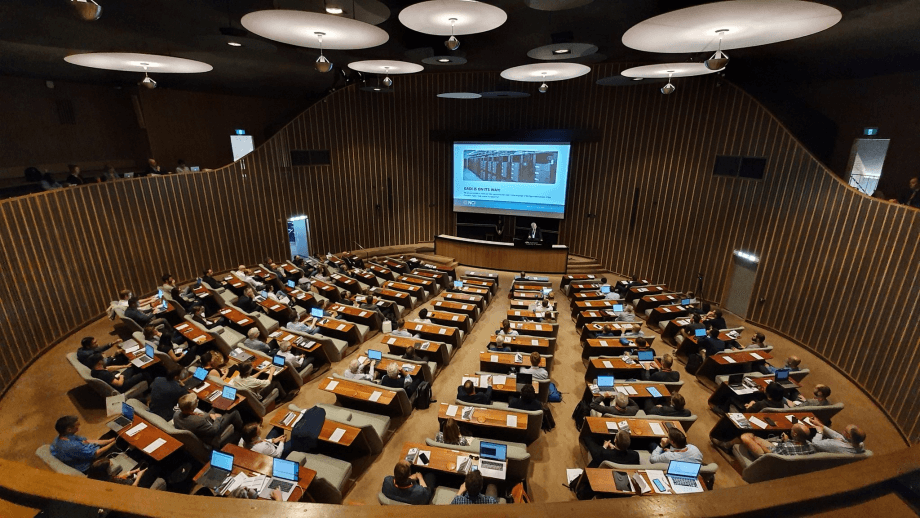Inaugural Australasian Leadership Computing Symposium (ALCS) celebrated research and learning
NeSI team members were among more than 150 of Australia's computational and data scientists who gathered in Canberra from 6-8 November 2019 for the inaugural Australasian Leadership Computing Symposium (ALCS).
The event, organised by Australia’s National Computational Infrastructure (NCI) in conjunction with the Pawsey Supercomputing Centre and NeSI, was as an opportunity for researchers to extend their networks, share leading practice, learn from their peers, and build their understanding of the role of high-performance computing (HPC) and high-performance data (HPD) in their current and future work.
The event gathered researcher communities from five key streams of science — astronomy, climate and weather, genomics, geosciences and materials science — and consisted of a series of plenary talks and discussions involving scientists and leaders from various Australian and international science institutions.
Most presentations are available at https://opus.nci.org.au/display/Help/Program.
NeSI team members, Wolfgang Hayek and Alex Pletzer, represented NeSI and New Zealand at the conference.
Wolfgang delivered a plenary presentation on NeSI activities and impacts from its consultancy service, sharing examples of how NeSI worked closely with researchers to help them achieve better and faster performance on its systems.

Alex presented a talk entitled “Conservative Interpolation of Vector Fields” [https://opus.nci.org.au/display/Help/Climate+and+Weather+Stream?preview=/48497238/50236156/ALCS_ClimateAndWeather_Pletzer_released.pdf] in the climate weather stream. His talk focused on using interpolation methods that conserve fluxes and vorticity for vector fields that have staggered components (e.g. on Arakawa C/D grids).
The week began with a training day, featuring beginner and advanced streams within the themes of HPD and HPC. It was interesting to see how NCI, which plays a role in Australia similar to that of NeSI in New Zealand, delivers training and how it balances the needs of supporting users with software installation and delivering the training material.
The main Symposium began on Wednesday with an interesting plenary talk in the morning by Professor Peter Littlewood from the University of Chicago, exploring ‘Computational Science in an Exascale World’. He touched on how computational Material Science is multiscale, from pico seconds to milli-seconds, and computational tools range from quantum chemistry to finite elements. He also talked about integrating simulations with experiments, and made interesting comparisons between in vivo with in silico (using a computer) in terms of energy consumption (20 W for the brain).
His presentation was followed by plenary talks by Rosie Hicks from the Australian Research Data Commons, and Professor Andy Pitman from the University of New South Wales.
After lunch, the discussion turned towards the user community. Wolfgang’s plenary shared a New Zealand perspective, and was followed by a User Forum discussion from CSIRO's Dr Amanda Barnard. NCI's own Drew Whitehouse rounded out the day with a presentation of recent and upcoming scientific visualisations.
Day 2 and 3 had attendees split off into their scientific streams to hear specific presentations about current computational and data aspects of scientific research in those fields, as well as discuss upcoming challenges and issues that as a community they are facing.
Highlights from that portion of the programme included:
Clare Richards and discussions on what NCI is doing to help its researchers download Climate Model Intercomparison Program (CMIP6) data (https://esgf.nci.org.au/projects/esgf-nci/). Tens of institutions around the world have developed climate prediction models which are run under specific C02 increase scenarios and other conditions to facilitate cross model comparison. Many research groups are interested in these data, which may impact future insurance premiums, whether or when the northwest passage might be open for shipping and to what extent the risk of flooding/tornado/drought might change. Researchers in New Zealand might want to access a subset of the data in the next few years. Although it is expected that the total amount of data will exceed 20 PB, we anticipate that New Zealand researchers will need about 100-200 TB. NCI is spending 2.5 FTE to support its researchers through the development of CLEF and other tools that make it easy to browse the archive. NeSI is currently consulting a research project on this topic.
Charmaine Franklin (BoM) presented an interesting talk on ensemble modelling (https://opus.nci.org.au/download/attachments/48497238/ALCS_ClimateAndWeather_Franklin_released.pdf?version=1&modificationDate=1573529799473&api=v2)
Mika Pearce presented a talk on coupling fire modelling with weather, sharing another example of how weather simulation feeds into other research areas. (https://opus.nci.org.au/download/attachments/48497238/ALCS_ClimateAndWeather_Peace_releasedv2.pdf?version=1&modificationDate=1573530314744&api=v2).
Drew Whitehouse hosted a good session on advanced visualization. They produced a sleek movie about eddies in the Southern ocean (https://www.youtube.com/watch?v=t-FqF6PFDP0).
Joerg Henrichs delivered an interesting talk on PSyclone and the separation of concerns. It allows scientists to write Fortran code and then use a domain specific tool to map the code onto cores or GPUs, depending on the architecture. He used NEMO as an example and was able to squeeze a few percent performance with this approach.
The Symposium wrapped up with plenary talks from Dr Thomas Keane from the European Genome Phenome Archive and Professor Mark Parsons from the Edinburgh Parallel Computing Centre.
Overall, the event was an excellent opportunity for NeSI, NCI and Pawsey to work together and to connect with research communities breaking new ground in the HPC and HPD space. This sort of collaboration is important and valuable – and NeSI looks forward to supporting it again in the future.






